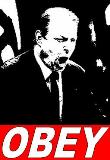The common goal, [Gebran Tueni] said, was to "restore democracy so we can have elections, and then we can compete with each other." On the broader front, concerning the wisdom of charting a similar course for Iraq, he had no doubts: "George Bush is doing the right job in the Middle East for us, believe me." Tueni's only reservation was his belief that Lebanon, endowed with a rich pre-Syrian legacy of democratic institutions, deserved a chance to lead the way: "We really think if the big issue is about the Middle East, about changing the world, Lebanon is the answer."
An-Nahar's new building had armed guards and bulletproof security shields and doors. But sitting in his corner office with its big picture windows, not far from the spot where Hariri was murdered, Tueni seemed both brave and terribly vulnerable. I asked him if his own life was in danger. He said he expected a wave of Syrian-backed "assassinations, booby-trapped cars," but did not think that could stop Lebanon's democratic movement. "They can kill one, two, three of us" he said, but then they are "finished."
He paused and smiled, "Better," he said, if they stop at "one."
They didn't. Gebran Tueni has now become the latest casualty in a series of terrorist bombings that are an assault not only on Lebanese democracy, but on all those in the Middle East--or anywhere else, for that matter--who believe government should be a matter of civil compact, not of rule by blood and fear. The urgent question by now is not only who precisely gave the order or laid the bomb, but who will act to put an end to this terror, and how. |











